Call of Duty Addiction Lawsuit
- Last Updated: July 14th, 2025

Attorney Jessica Paluch-Hoerman, founder of TruLaw, has over 28 years of experience as a personal injury and mass tort attorney, and previously worked as an international tax attorney at Deloitte. Jessie collaborates with attorneys nationwide — enabling her to share reliable, up-to-date legal information with our readers.
Legally Reviewed
This article has been written and reviewed for legal accuracy and clarity by the team of writers and legal experts at TruLaw and is as accurate as possible. This content should not be taken as legal advice from an attorney. If you would like to learn more about our owner and experienced injury lawyer, Jessie Paluch, you can do so here.
Fact-Checked
TruLaw does everything possible to make sure the information in this article is up to date and accurate. If you need specific legal advice about your case, contact us by using the chat on the bottom of this page. This article should not be taken as advice from an attorney.
Key takeaways:
- Activision faces lawsuits alleging that Call of Duty deliberately uses psychological manipulation through reward systems, microtransactions, and addictive gameplay mechanics to maximize player engagement and spending, particularly targeting vulnerable younger players.
- The lawsuit claims that prolonged Call of Duty addiction can lead to severe health consequences, including mental health issues, physical problems, and financial harm from compulsive in-game purchases.
- To qualify for the lawsuit, plaintiffs should collect evidence of addiction-related harm through medical documentation, detailed gaming history, proof of in-game purchases, and expert testimony demonstrating how Call of Duty's design features directly contributed to their injuries.
Overview of the Call of Duty Addiction Lawsuit [2025 Update]
Call of Duty Addiction Lawsuit claims focus on Activision’s alleged use of psychologically driven design elements — such as reward systems, feedback loops, and microtransactions — that some claim are meant to foster addictive behavior.
The Call of Duty franchise, developed by Activision, is now at the center of a series of lawsuits alleging addiction-related harm and deceptive practices by gaming companies.
Legal experts argue that these strategies popular games, which include sophisticated, patented technologies, contribute to significant mental and financial consequences for players, particularly among younger audiences.
On this page, we’ll provide an overview of the Call of Duty addiction lawsuits, severe health effects of video game addictions, eligibility for the Call of Duty addiction lawsuit, and much more.
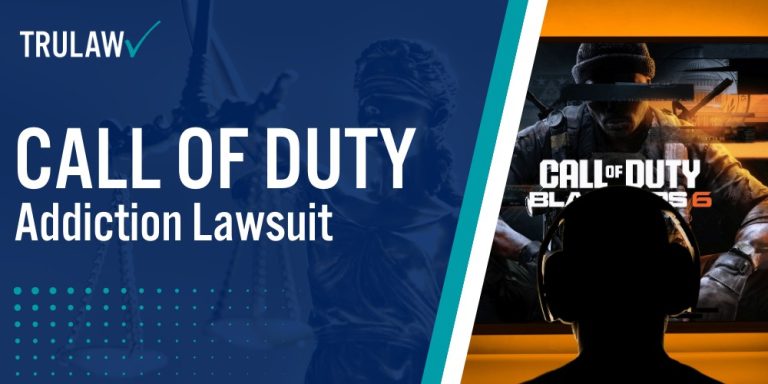
Lawsuits Against Video Game Developers for Addiction-Related Harm: Activision
The lawsuits allege that Activision prioritizes profits over player welfare, particularly the well-being of minors, who are especially susceptible to gaming addiction.
Plaintiffs claim that Activision, among other major video game companies, knowingly employs techniques to maximize player retention and spending, even as research points to possible harms, including addiction, psychological distress, and desensitization to violence.
Allegations in the Call of Duty addiction lawsuits include:
- Addictive Gameplay Mechanics: Plaintiffs allege that Call of Duty’s design utilizes advanced reward systems and feedback mechanisms to encourage continuous play and spending.
- Psychological Manipulation: The lawsuits argue that the game leverages insights from psychology and neuroscience to increase engagement and addiction potential, especially among minors.
- Deceptive Practices: Activision is accused of failing to inform players about the potential risks associated with prolonged play and spending habits fostered by in-game purchases.
- Monetization Tactics: Techniques such as microtransactions, loot boxes, and battle passes are highlighted as strategies to maximize profit, often at players’ expense.
- Ethical Concerns for Minors: The lawsuits argue that Activision’s approach knowingly exploits the vulnerabilities of younger players, making addiction a foreseeable consequence of its design.
Activision has consistently marketed Call of Duty as one of the most engaging and immersive experiences in the video game industry.
If you or a loved one has suffered from addiction, psychological distress, or financial harm due to Call of Duty’s manipulative game design, you may be eligible to seek compensation.
Contact TruLaw using the chat on this page to receive an instant case evaluation to see if you qualify to join others in filing a Call of Duty addiction lawsuit today.
Table of Contents
How Call of Duty Contributes to Gaming Addiction
The Call of Duty (CoD) franchise, renowned for its immersive first-person shooter gameplay, also incorporates design elements that can contribute to gaming addiction.
The franchise’s intense graphics, fast-paced action, and reward-based systems create a powerful gameplay experience that keeps players engaged.
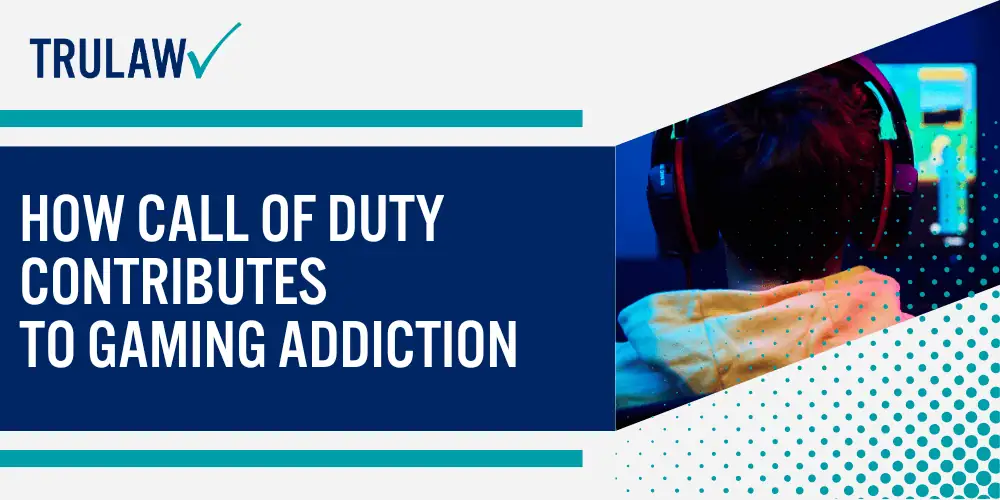
CoD’s popularity is partly due to its psychological strategies for maximizing player engagement, including competitive structures, in-game achievements, and social interactions, which can make it challenging for some players to moderate their gaming time.
As a result, Call of Duty has been noted as a game with potential for addiction, particularly among players susceptible to addictive behavior.
Psychological Manipulation and Game Design Elements
Call of Duty employs several game design strategies rooted in psychological principles to enhance player retention.
These elements not only heighten the excitement and intensity of the game but can also promote compulsive playing patterns by rewarding players frequently and unpredictably.
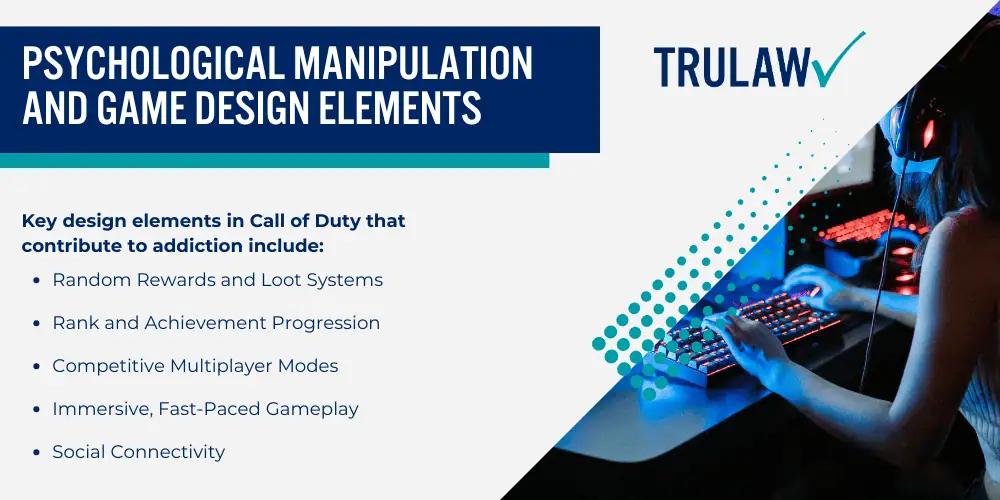
Key design elements in Call of Duty that contribute to addiction include:
- Random Rewards and Loot Systems: The franchise frequently uses randomized rewards, such as loot crates, which leverage the psychological principle of variable reinforcement.
- Rank and Achievement Progression: CoD’s rank-based structure and skill-based progression provide a sense of accomplishment and motivation for players to continually improve, often pushing them to play more and achieve higher ranks or unlock special items.
- Competitive Multiplayer Modes: The highly competitive nature of CoD, with team-based and ranked modes, encourages players to return to maintain or improve their skill and standing, creating a cycle of continuous play.
- Immersive, Fast-Paced Gameplay: The intense action and rapid decision-making required in CoD can create an adrenaline rush, enhancing engagement and prompting players to replay levels to perfect their skills.
- Social Connectivity: CoD offers multiplayer modes where players connect with others, creating both a sense of community and a competitive environment that motivates continued play, often to keep up with friends or team members.
These elements foster an environment that can lead to addictive behavior, as players feel compelled to keep playing to achieve rewards, maintain social connections, or gain a competitive edge.
The Role of In-Game Purchases and Microtransactions
In-game purchases and microtransactions in Call of Duty play a significant role in reinforcing addictive behaviors.
Through in-game stores, players can purchase weapons, skins, or character upgrades, which can enhance gameplay but also encourage spending and time investment.
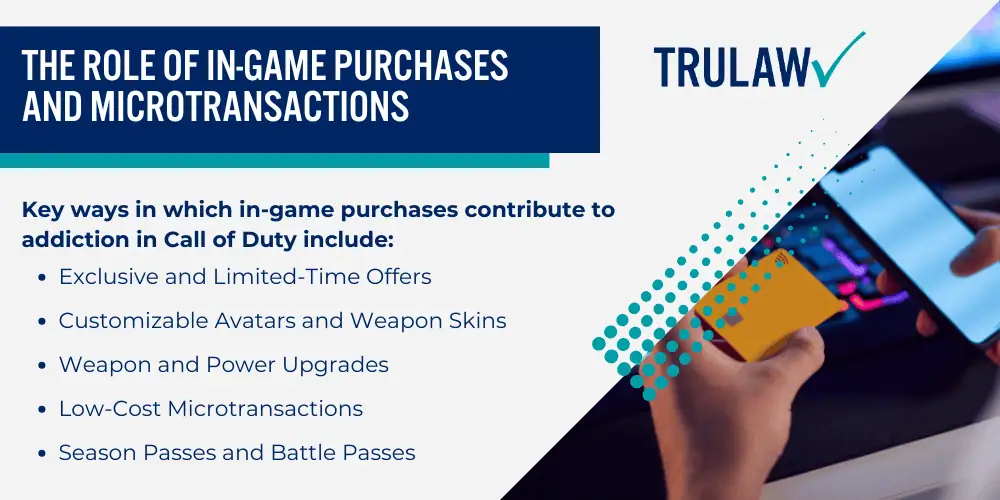
Key ways in which in-game purchases contribute to addiction in Call of Duty include:
- Exclusive and Limited-Time Offers: CoD regularly releases time-sensitive, exclusive content that triggers FOMO (Fear of Missing Out), pressuring players to make purchases or play more frequently to secure these items.
- Customizable Avatars and Weapon Skins: Players can buy unique skins, avatars, and other items to personalize their game experience, which can create an ongoing need for “cosmetic” purchases, reinforcing a pattern of spending.
- Weapon and Power Upgrades: Some purchases allow players to access advanced weapons or abilities, creating a pay-to-win dynamic that encourages spending for competitive advantage.
- Low-Cost Microtransactions: Microtransactions are often priced at low amounts, which may feel insignificant individually but can add up quickly, encouraging a spending habit that enhances the addiction cycle.
- Season Passes and Battle Passes: CoD’s seasonal content offers rewards for completing specific objectives within a limited time, incentivizing players to invest time and money consistently throughout each season.
The combination of addictive gameplay design and monetization strategies in Call of Duty can lead to a compulsive cycle of spending and playing.
For young players, who may already be vulnerable to addiction, these elements create an environment that can be difficult to moderate, leading to potential mental, social, and financial consequences.
If you or a loved one has suffered from addiction, psychological distress, or financial harm due to Call of Duty’s manipulative game design, you may be eligible to seek compensation.
Contact TruLaw using the chat on this page to receive an instant case evaluation to see if you qualify to join others in filing a Call of Duty addiction lawsuit today.
Severe Health Effects of Video Game Addictions
Video game addiction can lead to a range of severe health effects that impact both mental and physical well-being.
As players become engrossed in the virtual worlds and rewards that games offer, they may experience disruptions in real-life responsibilities, relationships, and personal health.
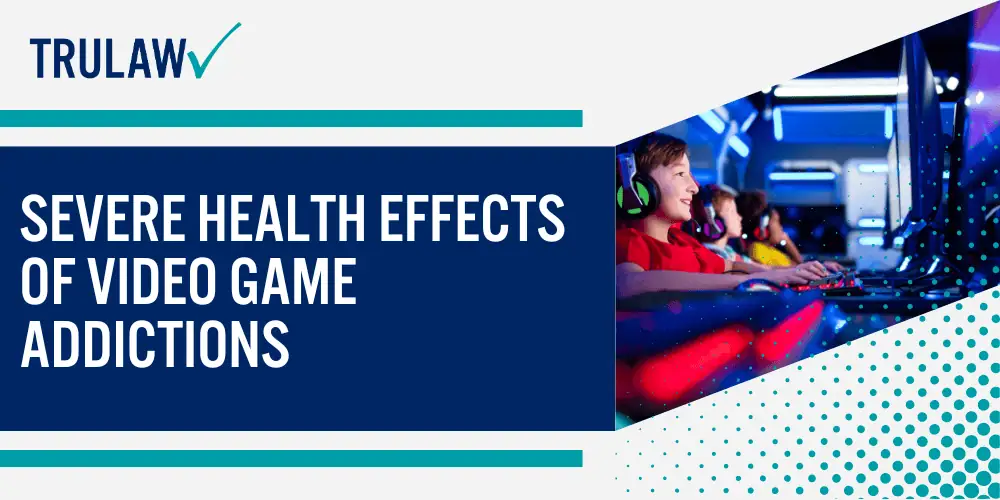
Games designed to sustain engagement, particularly those with elements such as in-game rewards, competitive rankings, and immersive narratives, can create a cycle of excessive play that proves difficult to break.
For many individuals, these prolonged gaming habits can result in significant mental health challenges and physical health risks over time.
Mental Health Consequences and Social Isolation
Gaming addiction often leads to mental health issues that can affect daily functioning, emotional stability, and social relationships.
As individuals become increasingly invested in playing video games alone, they may withdraw from real-world interactions and responsibilities, leading to social isolation and a reliance on gaming for emotional satisfaction.
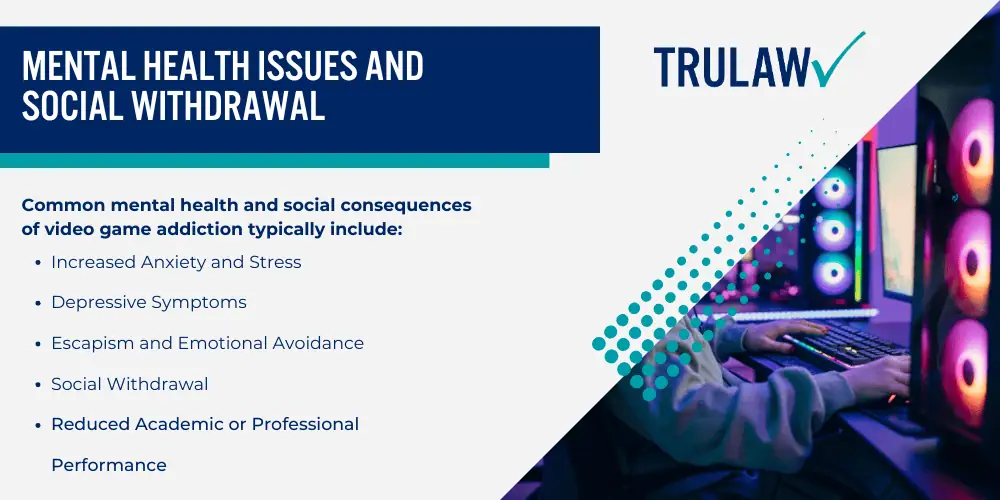
Common mental health and social consequences of video game addiction typically include:
- Increased Anxiety and Stress: Games with high-stakes, fast-paced action can heighten stress levels, leaving players anxious or tense even outside of gameplay.
- Depressive Symptoms: Continuous gaming can lead to a decline in real-life interactions and accomplishments, which may contribute to feelings of hopelessness, low self-esteem, or depression.
- Escapism and Emotional Avoidance: For some individuals, games become a primary escape from real-life issues, reinforcing avoidance behaviors and preventing them from addressing personal problems.
- Social Withdrawal: Excessive gaming often reduces face-to-face social interactions, leading to a lack of close relationships and support systems, which can deepen feelings of loneliness.
- Reduced Academic or Professional Performance: Time devoted to gaming often comes at the expense of work or studies, resulting in academic or job performance declines, which can increase stress and compound mental health issues.
These mental health challenges create a cycle that further entrenches gaming addiction, as individuals may turn to the addictive video games as a coping mechanism, exacerbating social isolation and emotional distress.
Physical Health Risks: Long-Term Consequences
In addition to mental health effects, video game addiction can lead to physical health risks due to prolonged sedentary behavior, lack of exercise, and poor lifestyle choices.
Extended gaming sessions, often accompanied by poor posture and limited physical activity, can cause serious long-term health issues.
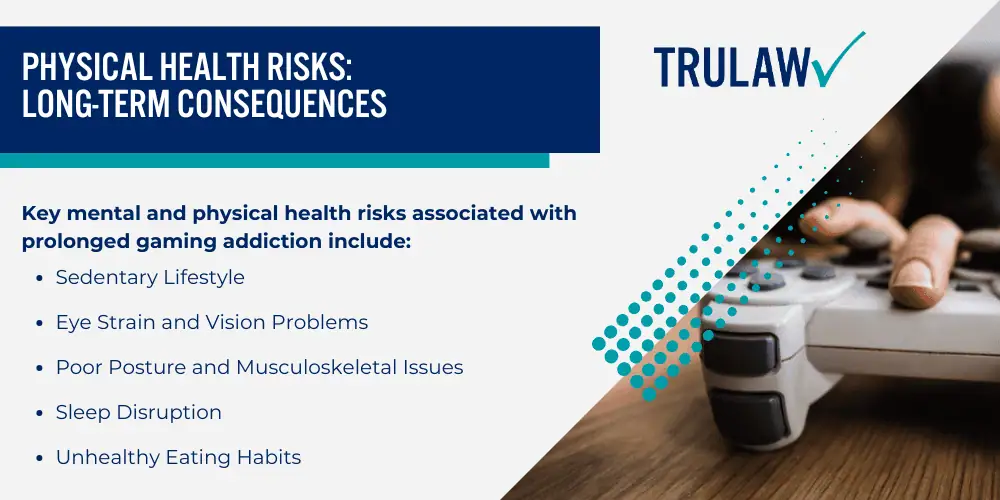
Key mental and physical health risks associated with prolonged gaming addiction include:
- Sedentary Lifestyle: Long hours of gaming reduce physical activity, increasing the risk of obesity, heart disease, and metabolic disorders over time.
- Eye Strain and Vision Problems: Prolonged screen exposure can lead to digital eye strain, blurred vision, and headaches, as well as a higher risk of long-term vision problems.
- Poor Posture and Musculoskeletal Issues: Sitting for extended periods, especially without proper ergonomic support, can result in back pain, neck strain, and repetitive strain injuries in the wrists and fingers.
- Sleep Disruption: Gaming addiction often leads to late-night sessions or irregular sleep patterns, which can interfere with the body’s natural sleep cycle and lead to fatigue, reduced mental clarity, and impaired immune function.
- Unhealthy Eating Habits: Extended gaming sessions can encourage reliance on fast food or snacks, resulting in poor nutrition, weight gain, and nutrient deficiencies.
These physical health consequences accumulate over time, leading to chronic health conditions that compound the mental and emotional toll of gaming addiction.
Addressing these issues is essential to managing gaming addiction and promoting long-term well-being, particularly for individuals prone to compulsive gaming behaviors.
If you or a loved one has suffered from addiction, psychological distress, or financial harm due to Call of Duty’s manipulative game design, you may be eligible to seek compensation.
Contact TruLaw using the chat on this page to receive an instant case evaluation to see if you qualify to join others in filing a Call of Duty addiction lawsuit today.
Eligibility for the Call of Duty Addiction Lawsuit
To qualify for a Call of Duty (CoD) addiction lawsuit, plaintiffs generally need to demonstrate that prolonged gameplay has resulted in significant mental or physical injuries or financial harm, likely due to specific game features designed to encourage excessive play.
Call of Duty is structured with elements such as competitive ranking systems, randomized rewards, and immersive social interactions, which can make it difficult for some players to moderate their gaming.
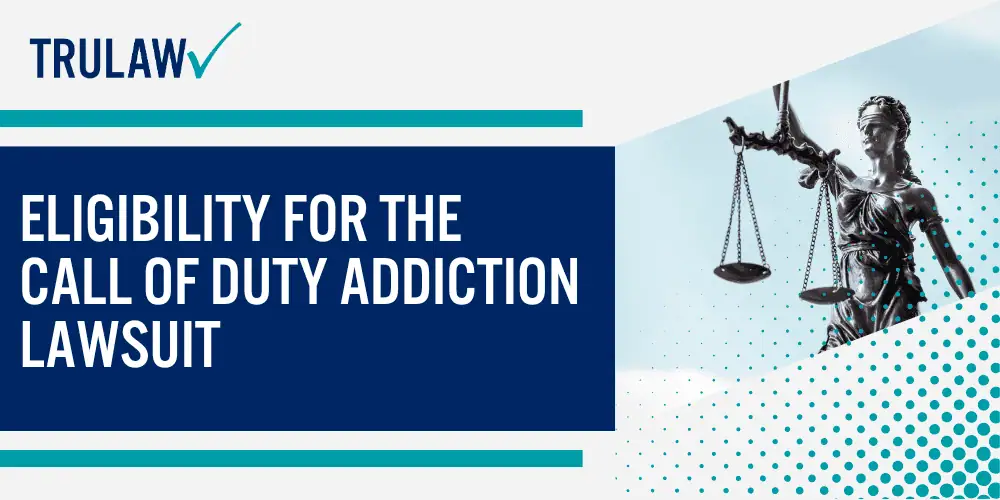
Plaintiffs in these cases may argue that CoD’s design intentionally promotes addictive behaviors without sufficient warning about the potential risks.
Eligibility for a lawsuit often requires evidence of addiction, the negative impact on one’s life, and a causal link between the addiction and CoD’s game mechanics.
Gathering Evidence for a Video Game Lawsuit
Building a strong case for a video game addiction lawsuit, such as one involving Call of Duty, requires gathering evidence to support claims that the addiction has caused verifiable harm.
This evidence must demonstrate a direct impact on the plaintiff’s well-being, lifestyle, or finances due to the game’s addictive design.
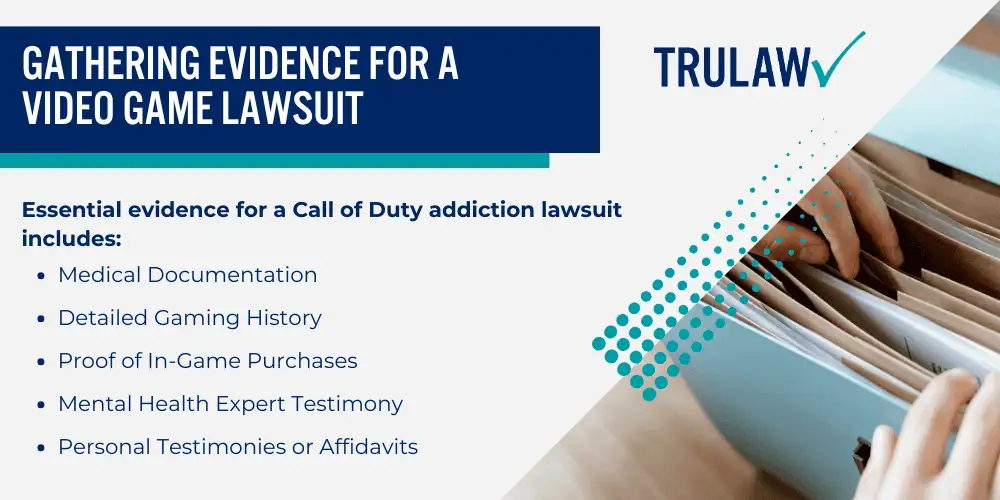
Essential evidence for a Call of Duty addiction lawsuit includes:
- Medical Documentation: Medical records indicating diagnoses or treatment for conditions such as gaming addiction, anxiety, or depression provide crucial evidence of the health impacts linked to excessive CoD gameplay.
- Detailed Gaming History: Logs of gameplay hours or in-game achievements show the extent of time spent on CoD, which helps illustrate the compulsive nature of the gaming behavior.
- Proof of In-Game Purchases: Financial records showing expenditures on microtransactions, such as loot boxes or upgrades, highlight the addictive spending behaviors tied to CoD’s monetization strategies.
- Mental Health Expert Testimony: Assessments from mental health professionals regarding the effects of CoD on the plaintiff’s mental health and behavior can substantiate claims of addiction and its related impact.
- Personal Testimonies or Affidavits: Statements from the plaintiff, family, or friends detailing changes in behavior, social isolation, or impacts on daily functioning can reinforce the claim of addiction and the game’s effects.
Together, this evidence can help demonstrate that CoD’s addictive gameplay design led to significant harm, building a strong foundation for a lawsuit.
Evaluating Damages in Call of Duty Addiction Lawsuit Claims
In Call of Duty addiction lawsuits, plaintiffs may seek various types of damages to address the broad impact of gaming addiction on their lives.
These damages provide financial relief for both the tangible and intangible losses associated with internet gaming disorder and addiction.
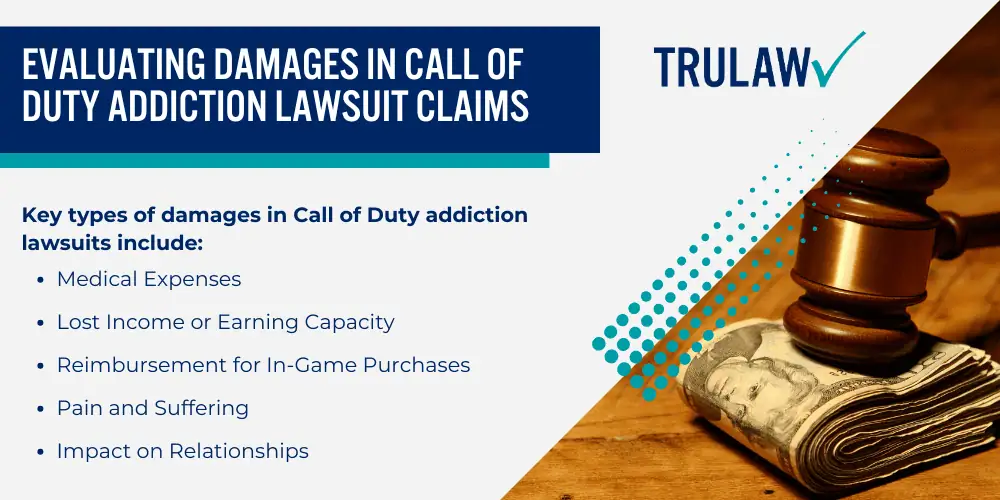
Key types of damages in Call of Duty addiction lawsuits include:
- Medical Expenses: Covers the cost of mental health treatments, counseling, or therapy sessions specifically related to treating gaming addiction or its associated conditions, such as anxiety or depression.
- Lost Income or Earning Capacity: Compensation for income lost due to reduced job performance, missed work, or the inability to maintain employment due to addiction.
- Reimbursement for In-Game Purchases: Recovery of funds spent on microtransactions or in-game items that were bought compulsively, especially if they contributed to the addictive cycle.
- Pain and Suffering: Damages for emotional distress, social isolation, or the personal toll of compulsive gaming, addressing the non-economic impacts of addiction.
- Impact on Relationships: Plaintiffs may seek compensation for strained family relationships or loss of consortium, particularly if gaming addiction caused substantial harm to their family life or marriage.
Evaluating these damages allows plaintiffs to seek compensation for the wide-reaching effects of CoD addiction.
By establishing clear harm and its link to the game’s design, plaintiffs can make a compelling case for compensation to address the mental, social, and financial consequences of their addiction.
If you or a loved one has suffered from addiction, psychological distress, or financial harm due to Call of Duty’s manipulative game design, you may be eligible to seek compensation.
Contact TruLaw using the chat on this page to receive an instant case evaluation to see if you qualify to join others in filing a Call of Duty addiction lawsuit today.
TruLaw: Accepting Clients for Call of Duty Addiction Lawsuits
Call of Duty video game addiction lawsuits are being filed by individuals across the country who were negatively impacted by the highly addictive nature of the popular video game series.
TruLaw is currently accepting clients for Call of Duty addiction lawsuits.
A few reasons to choose TruLaw for your Call of Duty addiction lawsuit include:
- If We Don’t Win, You Don’t Pay: The video game addiction lawyers at TruLaw and our partner firms operate on a contingency fee basis, meaning we only get paid if you win.
- Expertise: We have years of experience handling product liability cases similar to the Call of Duty lawsuits, which helps us anticipate what we can expect to see in your case and the regulations we will be required to meet.
- Successful Track Record: TruLaw and our partner law firms have helped our clients recover billions of dollars in compensation through verdicts and negotiated settlements.
If you or a loved one suffered from video game addiction due to playing Call of Duty, you may be eligible to seek compensation.
Contact TruLaw using the chat on this page to receive an instant case evaluation that can determine if you qualify for a Call of Duty addiction lawsuit today.
Video Game Addiction Lawsuit Frequently Asked Questions
-
The Call of Duty addiction lawsuit alleges that Activision knowingly designed the game with addictive features that cause psychological and financial harm to players.
The lawsuits focus on the company’s use of psychological manipulation through reward systems, feedback loops, and microtransactions that foster addictive behavior, particularly among younger players.
-
To join the Call of Duty addiction lawsuit, plaintiffs need to provide medical documentation, detailed gaming history, and proof of in-game purchases showing addiction-related harm.
Personal testimonies and statements from mental health professionals can also help demonstrate how the game’s design led to significant personal impacts.
-
Call of Duty addiction can lead to severe mental health issues including anxiety, depression, and social isolation.
Physical health risks include eye strain, poor posture, sleep disruption, and problems associated with a sedentary lifestyle.
-
Call of Duty uses psychological strategies like random rewards, competitive rankings, and social connectivity to maximize player engagement.
The game’s design elements include loot systems, achievement progression, and fast-paced gameplay that can trigger compulsive playing patterns.
-
In Call of Duty addiction lawsuits, plaintiffs can seek compensation for medical expenses, lost income, and reimbursement for in-game purchases.
Additional damages may include compensation for pain and suffering and impact on personal relationships.
-
Individuals who have experienced significant mental, physical, or financial harm due to Call of Duty addiction may qualify for the lawsuit.
TruLaw offers free case evaluations to determine eligibility and operates on a contingency fee basis, meaning no payment is required unless the case is won.
-
The Call of Duty addiction lawsuit is part of a growing trend within the gaming industry where companies like Activision Blizzard, Rockstar Games, and Epic Games face scrutiny for allegedly fostering addictive behaviors through their game designs.
Similar to controversies around Grand Theft Auto by Rockstar Games, these lawsuits often focus on whether developers disclose the potential psychological and financial impacts of features like microtransactions and loot boxes.
The outcome of this case could set a precedent for holding gaming companies accountable, potentially impacting how major publishers like Activision Blizzard and others design and market their games to players.

Managing Attorney & Owner
With over 25 years of legal experience, Jessica Paluch-Hoerman is an Illinois lawyer, a CPA, and a mother of three. She spent the first decade of her career working as an international tax attorney at Deloitte.
In 2009, Jessie co-founded her own law firm with her husband – which has scaled to over 30 employees since its conception.
In 2016, Jessie founded TruLaw, which allows her to collaborate with attorneys and legal experts across the United States on a daily basis. This hypervaluable network of experts is what enables her to share the most reliable, accurate, and up-to-date legal information with our readers!
Additional Video Game Addiction Lawsuit resources on our website:
Here, at TruLaw, we’re committed to helping victims get the justice they deserve.
Alongside our partner law firms, we have successfully collected over $3 Billion in verdicts and settlements on behalf of injured individuals.
Would you like our help?
At TruLaw, we fiercely combat corporations that endanger individuals’ well-being. If you’ve suffered injuries and believe these well-funded entities should be held accountable, we’re here for you.
With TruLaw, you gain access to successful and seasoned lawyers who maximize your chances of success. Our lawyers invest in you—they do not receive a dime until your lawsuit reaches a successful resolution!
AFFF Lawsuit claims are being filed against manufacturers of aqueous film-forming foam (AFFF), commonly used in firefighting.
Claims allege that companies such as 3M, DuPont, and Tyco Fire Products failed to adequately warn users about the potential dangers of AFFF exposure — including increased risks of various cancers and diseases.
Depo Provera Lawsuit claims are being filed by individuals who allege they developed meningioma (a type of brain tumor) after receiving Depo-Provera birth control injections.
A 2024 study found that women using Depo-Provera for at least 1 year are five times more likely to develop meningioma brain tumors compared to those not using the drug.
Suboxone Tooth Decay Lawsuit claims are being filed against Indivior, the manufacturer of Suboxone, a medication used to treat opioid addiction.
Claims allege that Indivior failed to adequately warn users about the potential dangers of severe tooth decay and dental injuries associated with Suboxone’s sublingual film version.
Social Media Harm Lawsuits are being filed against social media companies for allegedly causing mental health issues in children and teens.
Claims allege that companies like Meta, Google, ByteDance, and Snap designed addictive platforms that led to anxiety, depression, and other mental health issues without adequately warning users or parents.
Transvaginal Mesh Lawsuits are being filed against manufacturers of transvaginal mesh products used to treat pelvic organ prolapse (POP) and stress urinary incontinence (SUI).
Claims allege that companies like Ethicon, C.R. Bard, and Boston Scientific failed to adequately warn about potential dangers — including erosion, pain, and infection.
Bair Hugger Warming Blanket Lawsuits involve claims against 3M — alleging their surgical warming blankets caused severe infections and complications (particularly in hip and knee replacement surgeries).
Plaintiffs claim 3M failed to warn about potential risks — despite knowing about increased risk of deep joint infections since 2011.
Baby Formula NEC Lawsuit claims are being filed against manufacturers of cow’s milk-based baby formula products.
Claims allege that companies like Abbott Laboratories (Similac) and Mead Johnson & Company (Enfamil) failed to warn about the increased risk of necrotizing enterocolitis (NEC) in premature infants.
Here, at TruLaw, we’re committed to helping victims get the justice they deserve.
Alongside our partner law firms, we have successfully collected over $3 Billion in verdicts and settlements on behalf of injured individuals.
Would you like our help?

